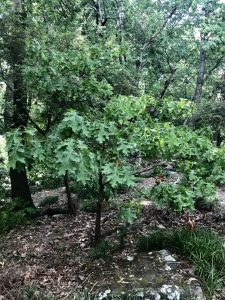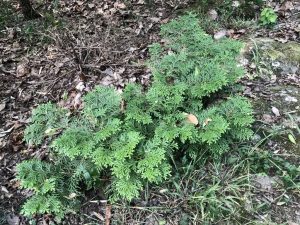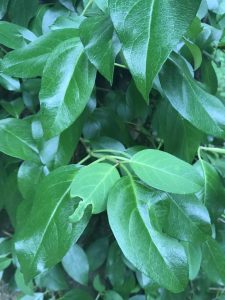 I have a tiny oak tree out back that used to be on its way to attaining an impressive size – until Hurricane Ivan hit and toppled a huge hickory tree onto it, effectively topping it.
I have a tiny oak tree out back that used to be on its way to attaining an impressive size – until Hurricane Ivan hit and toppled a huge hickory tree onto it, effectively topping it.
I know I should have taken it down when the tree company came to clear out the downed hickory, but I couldn’t do it. I liked that little oak, and over time it’s become my crazy tiny oak tree up in my rock outcrop – a hurricane survivor.
I was working up around that oak this morning, cutting a few dead branches out of it and wondering at its tenacity. Below it, also improbably growing in the rock outcrop, is a shrub called Thujopsis dolobrata – a prized specimen I planted years ago.
Unfortunately the Thujopsis started dying one summer, a victim to the previous fall’s drought. I watched anxiously as branch after branch eventually turned brown and died.
Unbelievably, about a third rallied and is still alive. I cut out the dead and now have half a shrub under my dwarfed oak tree. What a pair of misfits in the garden!
My imperfect garden might not be to everyone’s taste; but I’d rather have a little imperfection than everything being “just so”. A friend in the horticulture profession said it well:
 “Plants are living things like humans. They need water and sun and some need food and each grow in different ways. That yellow leaf at the bottom of the dracaena doesn’t mean that there is something wrong or that the plant is dying – it’s just a natural part of the life cycle. People need to understand that imperfect is beautiful.”
“Plants are living things like humans. They need water and sun and some need food and each grow in different ways. That yellow leaf at the bottom of the dracaena doesn’t mean that there is something wrong or that the plant is dying – it’s just a natural part of the life cycle. People need to understand that imperfect is beautiful.”
My physically imperfect tree and shrub were caused by events out of my control – a hurricane and a drought. Other imperfections are simply part of a plant’s life cycle, yellowing leaves, and damage caused by insects or animals.
While it’s important to maintain a healthy landscape, it’s also important to know when to relax and appreciate that some imperfection is normal and not always cause for immediate alarm.
With proper watering, fertilizing, pruning and general maintenance, your plants will be better prepared to weather anything nature throws at them – and you will too.
By Kris Blevons
